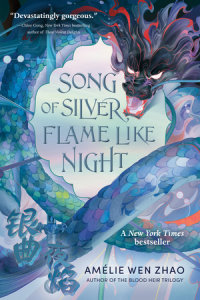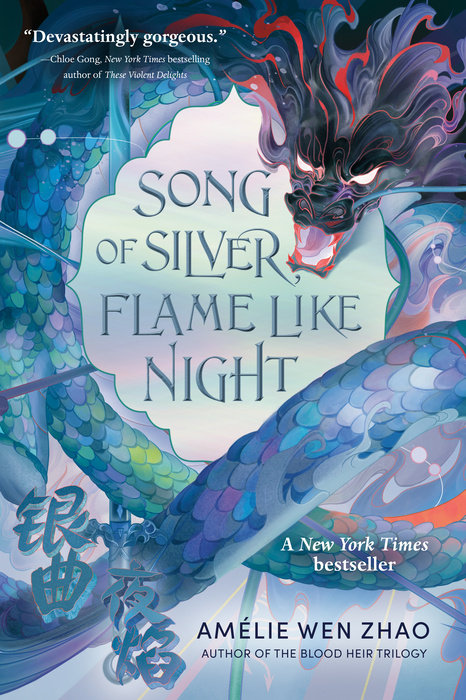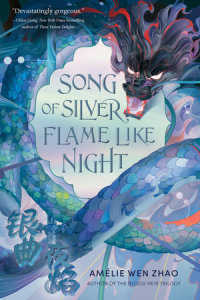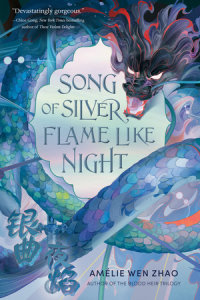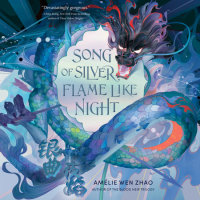Song of Silver, Flame Like Night
Song of Silver, Flame Like Night is a part of the Song of the Last Kingdom collection.
In a fallen kingdom, one girl carries the key to discovering the secrets of her nation's past—and unleashing the demons that sleep at its heart. An epic fantasy series inspired by the mythology and folklore of ancient China.
“Brims with pure magic. Zhao has woven together a story of self-discovery, slow-burning romance, and heart-pounding revelations.” —Rebecca Ross, #1 New York Times bestselling author of Divine Rivals
“A magical tale set in a glittering, dangerous world featuring a dynamic heroine and an enigmatic hero.” —Isabel Ibañez, #1 New York Times bsetselling author of What The River Knows
Lan spends her nights as a songgirl in Haak’gong, a city transformed by the Elantian colonizers. Her days are consumed by the search for knowledge about the strange mark—an untranslatable Hin character—burned into her arm by her mother in her last act before she died.
Zen is a practitioner—one of the fabled magicians of the Last Kingdom. He’s never seen anything like Lan’s mark, but he knows that if there are answers, they lie deep in the pine forests and misty mountains of the Last Kingdom, with an order of practitioning masters planning to overthrow the Elantian regime.
Yet, both Lan and Zen are hiding secrets—secrets that are buried deep within them. Secrets that even they have still to unearth. Both hold the power to liberate their land, if they don't destroy it first.
Now the battle for the Last Kingdom begins.
Inspired by ancient Chinese mythology and folklore, Song of Silver, Flame Like Night transports readers to a lush fantasy world filled with high-stakes adventure, glittering magic, and against-all-odds romance from beginning to end.
An Excerpt fromSong of Silver, Flame Like Night
1
Power is always borrowed, never created.
-- Dào’zǐ, Book of the Way (Classic of Virtues), 1.1
Elantian Age, Cycle 12
The Black Port, Haak’gong
The Last Kingdom had been brought to its knees, but the view was mighty fine from here.
Lan tipped her bamboo hat over her head, parting her lips in pleasure as the cool evening breeze combed through strands of her silky black hair. Sweat slicked her neck from the afternoon’s work of hawking wares at the local evemarket, and her back ached with the beating she’d received from Madam Meng for stealing sugarplum candies from the kitchens at the Teahouse. But in rare moments like this, when the sun hung ripe and swollen as a mandarin over the glittering sea, there was still a shattered-glass beauty to be found in the remnants of a conquered land.
The city of Haak’gong unfurled before her in a patchwork of contradictions. Red lanterns were strung from curved temple eave to gray-shingled rooftop, weaving and wending between pagodas and courtyards wreathed in the halo of night bazaars and evening fairs. On the distant hills, the Elantians had settled on higher ground, building their strange architecture of stone, glass, and metal to watch over the Hin like gods. The skyline glowed a dusky auric from their alchemical lamplight that spilled through stained-glass windows and arched marble doorways.
Lan rolled her eyes and turned away. She knew the story of the gods--any gods--to be a big, steaming bowl of turd. Much as the Elantians wished to pretend otherwise, Lan knew they had come to the Last Kingdom for one thing: resources. Ships full of powdered spices and golden grains and verdant tea leaves, chests of silks and samites, jades and porcelains, left Haak’gong for the Elantian Empire, across the Sea of Heavenly Radiance, each day.
And whatever was left over trickled into the black markets of Haak’gong.
At this bell, the evemarket was in full bloom, merchants having filed in along the Jade Trail with jewels that gleamed like the light of the sun, spices tasting of lands Lan had never seen before, and fabrics that shimmered like the night sky itself. Haak’gong’s heartbeat was the clink of coin, its lifeblood the flow of trade, its bones the wooden stalls of marketplaces. It was a place of survival.
Lan paused at the very end of the market. She took care to lower her dǒu’lì--her bamboo hat--over her face lest any Elantian officials prowled nearby. What she was about to do could very well earn her a spot on the gallows, along with other Hin who had broken Elantian laws.
With a surreptitious glance around, she crossed the street and made for the slums.
This was where the illusion of the Last Kingdom ended and the reality of a conquered land began. Here the cobblestone streets carefully constructed by the Elantians after the Conquest faded to dust; the elegantly renovated facades and shiny glass windows gave way to buildings crumbling from disrepair.
The trading house sat in a derelict corner, its cheap wooden doors chipped and faded with time, paper windows patched with grease yet sagging with the humidity of the south. A wooden bell tinkled somewhere overhead as Lan stepped inside.
She shut the doors, and the hubbub of the outside world fell silent.
The interior was dim, dust motes swirling in the late-afternoon sunlight that spilled onto cracked floorboards and shelves crammed with an assortment of scrolls, tomes, and trinkets. The entire shop looked like an old painting left to fade in the sun, smelling of ink and damp wood.
But this was Lan’s favorite place in the world. It reminded her of a time long past, a world long gone.
A life wiped from the pages of the history books.
Old Wei’s Pawn Shop dealt in odds and ends of goods left over from the evemarket after the Elantians had their pick, purchased by the shopkeeper at wholesale and sold to Hin buyers at a thin margin. The shop escaped the notice of government inspectors, for secondhand goods held no interest to the colonizers as long as they weren’t made of metal.
This was why the shop had also become a hub for contraband. The wares Old Wei had on display were innocuous enough: reels of wool, hemp, and cotton, jars of star anise and bay leaves, scrolls of cheap paper made from pounded dried bark. But hidden somewhere inside the shop, Lan knew, was something for her.
Something that could cost her life.
“Old Wei,” she called. “I got your message.”
Silence for a moment, and then: “Thought I heard your silver-bells voice. Come to bring me mischief again?”
The old shopkeeper announced himself in a shuffle of feet and a hacking cough. Old Wei had once been a teacher in a northeastern coastal village, before his family was killed and he’d lost everything in the Elantian Conquest twelve cycles ago. He’d fled to Haak’gong and used his literacy to pivot into the trading business. Constant hunger had whittled him to a stick, and the damp air of Haak’gong had afflicted him with a permanent cough. That was the extent of what Lan knew of his life--not even his truename, banned under Elantian law and reduced to a monotonous single syllable.
Lan gave him her sweetest smile from beneath her dǒu’lì. “Mischief?” she repeated, matching his northern dialect, the tones harsher and rolling compared to the sweet, singsong southern tones she’d become used to. It was a rarity to speak either these days. “When have I ever brought you mischief, Old Wei?”
He grunted, casting her an appraising look. “Neverbrought me fortune either. And I still let you come back each time.”
She poked her tongue out. “Must be my charm.”
“Hah,” he said, the word cracking through a thick layer of phlegm. “Any gods watching would know what lies beneath that charm.”
“There are no gods watching.”
It was a point she often liked to debate with Old Wei, who was a stout worshiper of the Hin’s pantheon of gods--in particular, his favorite, the God of Riches. Old Wei liked to tell Lan he’d devoutly prayed to the God of Riches in his childhood. Lan liked to remind him that the God of Riches must have a twisted sense of humor to have rewarded him with a rundown contraband shop.
“There are,” Old Wei replied. Lan raised her eyes heavenward and mouthed the words along with him--words she had heard a hundred times: “There are old gods and new gods, kind gods and fickle gods--and most powerful of them all are the Four Demon Gods.”
Lan preferred not to believe that her fortunes lay in the hands of some invisible old farts in the skies--no matter how powerful they were meant to be. “Whatever you say, Old Wei,” she replied, leaning over the counter and cupping her chin in her hands.
The old shopkeeper wheezed a few times, then asked, “Evemarket again? What, is the Teahouse not feeding you enough?”
They both knew the answer to that: Madam Meng ran the Teahouse like a glass menagerie, and her songgirls were her finest display. She fed them just enough to keep them dewy and ripe for the picking, but never enough so that their bellies grew full--gods forbid they become lazy or fat.
“I like it here,” Lan said, and she did. Out here, hawking alongside other vendors and pocketing the coin she made into herown pockets, was where she felt some semblance of control over her life--a taste of freedom and free will, if only temporary. “Besides,” she added sweetly, “I get to drop by to see you.”
He cast her a shrewd look, then tsked and wagged a finger. “Don’t try your honeyed words on me, ya’tou,” he said, and bent to the cabinets beneath his counter.
Ya’tou. Girl. It was what he’d called her since he’d found her, a scrap of an orphan begging on the streets of Haak’gong. He’d taken her to the only place he’d known that would welcome a girl with no name and no reputation: Madam Meng’s Teahouse. She’d signed a contract whose terms she’d barely been able to decipher, and whose length only seemed to swell and swell the harder she worked.
But at the end of the day, he’d saved her life. Gotten her a job, put a stable roof over her head. It was more kindness than one could ask for in these times.
She grinned at the sour old man. “I would never.”
Old Wei’s grunt turned into a bout of coughing, and Lan’s smile slipped. The winters down in the south had none of the biting cold that she’d grown up with in the northeast. Instead, it encroached with a damp chill that sank into bones and joints and lungs and festered there.
She took in the state of the battered old shop, the shelves that stood fuller than usual. Tonight, on the eve of the big festivities for the Twelfth Cycle of the Elantian Conquest, security had been tightened around Haak’gong, and the first thing people tended to avoid in those circumstances was a shop trading in illicit goods. Lan couldn’t afford to dally either: soon the streets would be crawling with Elantian patrols, and a lone songgirl in their midst was an invitation to trouble.
“Lungs acting up again, Old Wei?” she asked, running a finger over a small stained-glass dragon figurine on the counter--likely a prized trade from one of the Jade Trail nations across the great Emaran Desert. The Hin had not known glass until the era of the Middle Kingdom, under which Emperor Jīn--the Golden Emperor--established formal trade routes reaching all the way west to the fabled deserts of Masyria.
“Ah, yeah,” the shopkeeper said with a wince. From the folds of his sleeve, he drew what must once have been a fine silken handkerchief and patted his mouth with it. The cloth was sodden and graying with grime. “Ginseng prices have shot up since the Elantian farts learned of its healing properties. But I’ve lived with these old bones all my life, and they haven’t killed me yet. Nothing to worry about.”
Lan drummed her fingers on the wooden counter, polished with the comings and goings of so many others before her. Here was the trick to surviving in a colonized land: you couldn’t show that you cared. Every Hin you came across would have his share of sob stories: family slaughtered in the Conquest, home pillaged and plundered, or worse. To care was to allow a chink in the armor of survival.
So Lan asked the question that had been brewing in her chest all day. “Well, what do you have for me?”
Old Wei gifted her a gap-toothed smile and bent beneath his counter. Lan’s pulse began to race; instinctively she pressed fingers to the inside of her left wrist.
There, imprinted into flesh and sinew and blood, was a scar that only she could see: a perfect circle encompassing a character in the shape of a Hin word that she could not read, sweeping strokes blooming like an elegantly balanced flower--blossom, leaves, and stem.
Eighteen cycles she’d lived, and she had spent twelve of those searching for this character--the only clue to her past that her mother had left her before her death. To this day, she could feel the searing heat of her mother’s fingers on her arms, the hole in Mama’s chest bleeding red even as the world erupted in blinding white. The expensive lacquerwood furniture of their study darkened with blood, the air filled with the bitter scent of burnt metal . . . and something else. Something ancient; something impossible.
“Now, I think you’ll like this one.”
She blinked, the images dissipating as Old Wei emerged from the dusty shelves and placed a scroll on the counter between them. Lan held her breath as he unfurled it.
It was a worn piece of parchment, but even with one look, she could tell that it was different: the surface was smooth,unlike the cheap papers made of hemp or rags or fishnet common these days. This was true parchment--vellum,perhaps--singed black in the corners and smudged with age. She’d known the feel of it intimately, once a world ago.
Between the wear and tear, Lan could make out faded traces of opulence. Her eyes raked over the sketches of the Four Demon Gods in the corners of the page, barely visible but present nevertheless: dragon, phoenix, tiger, and tortoise, all facing the center of the scroll, frozen in time. Swirls of painted clouds adorned the top and bottom margins. And then . . .there, in the very center, ensconced within a near-perfect circle: a single character, blooming with the delicate balance of a Hin character, yet with nothing recognizable. Her heart jumped into her throat as she leaned over it, barely breathing.
“I thought you’d be excited,” Old Wei said. He watched her carefully, eyes glinting with the prospect of a sale. “Wait till you hear where I got it.”
She barely heard him. Her pulse thundered in her ears as she traced the strokes of the character, following every line and comparing it to the character she’d memorized well enough to know in her dreams.
Her excitement faltered as her finger stuttered over a stroke. No . . .no. A line cut too short, a dot missing, a diagonal slightly off . . . Minute differences, but all the same--
Wrong.
She slumped, letting out a sigh. Sloppily, she rotated her wrist, finger tracing a loose circle to finish up the character.
That was when it happened.
The air in the shop shifted, and she felt as though something inside her had snapped into place--an invisible current that rushed from her fingertips into the shop. Like a static shock in winter.
It was gone in half a second, so quickly that she must have imagined it. When she blinked again, Old Wei was still watching her with pursed lips. “Well?” he asked eagerly, leaning forward over the counter.
He hadn’t felt it, then. Lan touched the tip of her fingers to her temples. It hadn’t been anything--a momentary lapse in focus, a trick of the nerves, brought on by hunger and exhaustion. “It’s a bit different,” she replied, ignoring the familiar disappointment that curdled in her stomach.
It had been so close . . . and yet it wasn’t.
“Not what you’re looking for, then,” Old Wei said, clearing his throat, “but I think it’s a start. See here--the syllabary seems to be composed in the same style as yours, with those curves and dashes . . . but the circle outside is really what caught my attention.” He tapped two calloused fingers to the page. “Everything we’ve seen with a circle around the character has been there only for decoration. But see how these strokes bleed into the circle? They were written in a conjoined line--a clear beginning and end.”
